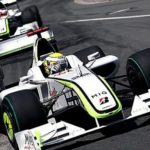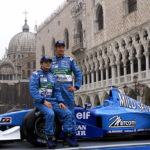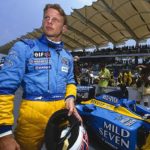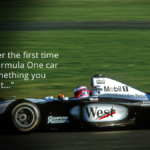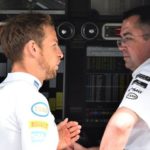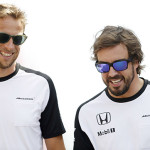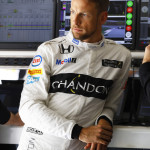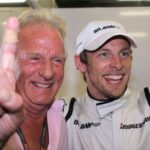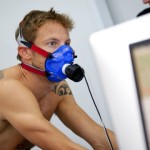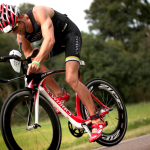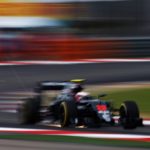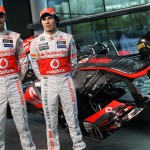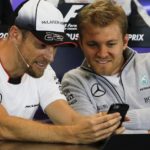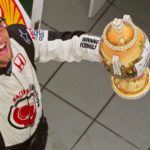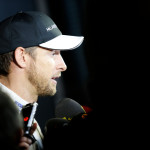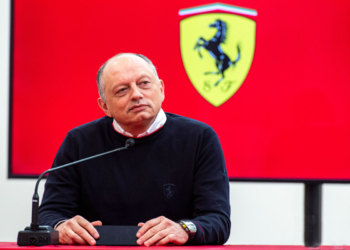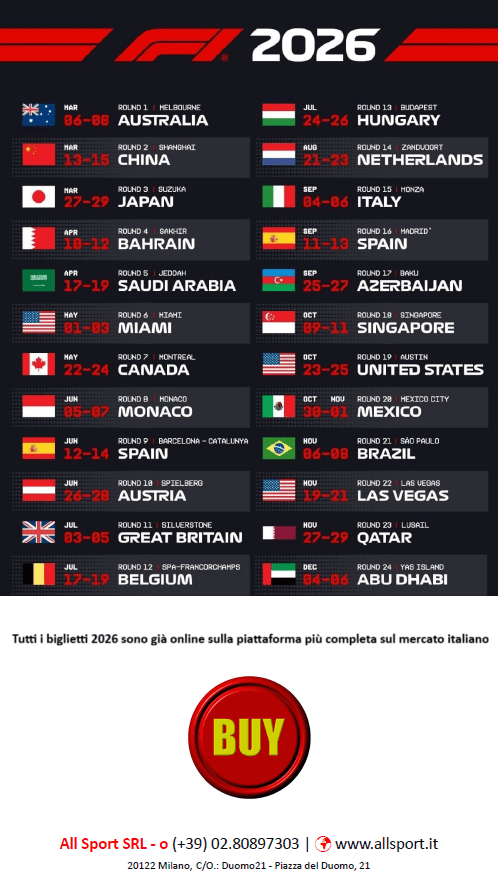Il GP di Abu Dhabi di questo weekend sarà la 305° e per il momento ultima gara in F1 per Jenson Button, che nel 2017 lascerà il volante della sua McLaren
a Stoffel Vandoorne e inizierà un nuovo capitolo nella sua vita. Resterà comunque parte del team di Woking, ma nel frattempo si guarda anche intorno, a nuove sfide al di fuori della Formula 1, come leggerete in questa interessante intervista pubblicata sul sito www.formula1.com
Q: Jenson, your active F1 racing career is coming to an end after the season finale in Abu Dhabi – at least that is state of affairs right now. When you sit back and reflect on your many years in Formula One, what comes to mind? Something funny, something sad…
Jenson Button: Wow, it’s still too early for me to reflect. Somehow it doesn’t feel right, because it’s not over unless it is over!
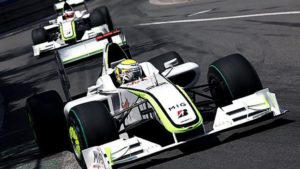 Q: Then what about good and bad times?
Q: Then what about good and bad times?
JB: Of course every career has ups and downs. I always preferred to have massive highs and massive lows instead of a stagnant career – and I’ve got it! (Laughs) I definitely had highs and lows. And I remember very well the highs – and like any human being I try to forget the lows. I definitely remember crossing the finish line in Brazil winning the world championship. I also remember the first time driving a Formula One car – that is something that you never forget as it is very special. It was in 1999 and it was a McLaren. At Silverstone. It was the ‘prize’ for winning the British Formula Ford championship and thus the young driver award. I wasn’t allowed to do many laps, but I thought ‘hey, this is fun’ and ‘that’s for me’. My first proper test was then with Prost. It was at Barcelona and when I came back to the finish line I had a very broad smile on my face. So many happy moments – but I will keep them all for my book!
Q: You have been able to stay in Formula One for an incredibly long time. That is not a simple thing to achieve. Is there any secret attached to this fact?
JB: No secret. My guess is that I have stayed in F1 so long – and wanted to stay – because it is always changing. It is about being able – and willing – to learn something new. That is a big difference to most other sport where it always stays the same. F1 is always changing. The performance of the package that you have is always changing – and so does your competition. That’s what kept me excited and every year coming back for more.
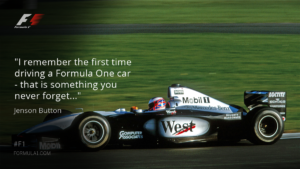 Q: In fact you came back 16 years for more – and always as a driver who got paid, never as a pay driver. That’s nowadays is the most difficult thing to achieve….
Q: In fact you came back 16 years for more – and always as a driver who got paid, never as a pay driver. That’s nowadays is the most difficult thing to achieve….
JB: Ha, yes, I have never paid to drive. And that is very difficult for British drivers to achieve, as there is very little backing in motorsport. The government doesn’t fund us and there aren’t many sponsors around. South American drivers get much more support either from governments or big sponsors.
Q: As somebody who never really benefited from sponsor power opening doors for you, one could probably say that your skills where your best supporter. What are the three essential traits in the DNA of an F1 driver in order to survive here?
JB: Willing to learn – and that means also to have an environment that keeps you excited, as you get bored pretty fast. Of course you need luck – and being able to build on that: your race craft, your technical ability and being able to work with the partners and sponsors in the right manner. And, of course, you have to be quick. Without that nothing else helps in the long run.
Q: How ‘political’ do you have to be?
JB: I would say that Formula One drivers are no political animals. Yes, we are not as open as the media wants us to be, but that has nothing to do with politics…
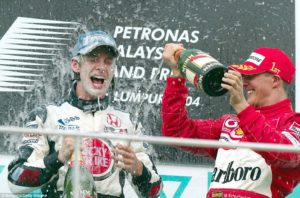 Q: But we see that some drivers use the media very intensely for their own benefit…
Q: But we see that some drivers use the media very intensely for their own benefit…
JB: I don’t know who you mean. For example, Lewis (Hamilton): he has a big following on social media – but of course he does: he is a three-time world champion. If he wasn’t a three-time world champion he wouldn’t have that kind of following. If you are in a position like Lewis and you post a picture then, of course, that will not go unnoticed. And in reality you have to say he is doing all that for the fans.
Q: You will continue with McLaren in 2017 in an advisory role, so you will stay close to the sport. As one of the most experienced guys in the paddock, your voice very likely will be heard. What do you want to change in Formula One?
JB: I will not change anything in the F1 unless I am running to sport – which I won’t be! In terms of McLaren, my job won’t be about developing the car because I won’t be driving it. I will listen to the feedback of the drivers and will try to help the team understand what the drivers’ feedback means, because that is sometimes not so easy in the heat of the moment. My aim – or my job – will be helping build the team, polishing the team. If you have been looking at a team for so long from one side and suddenly get the chance to step back and take a look from another point of view, I am sure there is a lot we can learn.
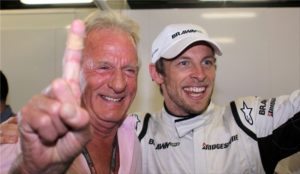 Q: No driver makes it into Formula One without the help of other people. Who else helped pave your way?
Q: No driver makes it into Formula One without the help of other people. Who else helped pave your way?
JB: Obviously my father played a significant role in my career. He was the reason I started racing. He raced in rallycross and I loved watching him. I loved the smell of rubber – and the noise. I was only five or six years old. When I was seven he bought me a kart. So definitely I can say that he inspired me. When I raced I really loved the attention you got on the podium – and I loved winning and seeing that my trophy was bigger than theirs! We here all love ‘kicking somebody else’s ass’! (Laughs) Winning obviously helped propel my career – to be able to move to better cars and more serious categories until I finally made it into F1. At that stage I was managed by a group around David Robertson, whom I always respected until the day he passed away, even though we went separate ways long before.
Q: Formula One is a very high-profile racing series and that means it sometimes isn’t easy on one’s private life…
JB: Well, that’s the price you have to pay when you do the best job in the world: driving a Formula One car! Yes, sometimes it is a bit annoying, because you are, after all, a sportsman and not a singer or an actor who lives through publicity. But no job is perfect. (Laughs) From next year on I am sure I will live a much simpler life.
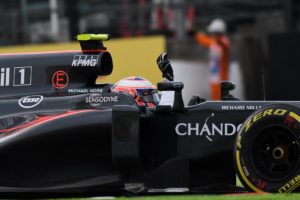 Q: Are there any goals you still have? You may now be a bit old for Formula One, but for other careers, at 36 you are still a man in his prime…
Q: Are there any goals you still have? You may now be a bit old for Formula One, but for other careers, at 36 you are still a man in his prime…
JB: I am fitter than ever. I aim to be a world champion in triathlon in my age group as an amateur – not as a pro. And I would love to race in Le Mans. Rallycross is also on my to-do list – eventually. There are so many things that I want to do.
Q: Rumour has it you have been very careful with the money that you’ve earned in F1…
JB: …but I wasted a lot – actually not wasted: I’ve spent a lot of money. That comes with the fact that you travel around the world. So you have to enjoy it, as you can’t take it with you. I hope that if I have kids one day I have something left for them. Probably one day I will ask myself: ‘How did I end up with that, when I earned that?’ (Laughs) But I am sure I still will be fine. Nobody should worry about me.
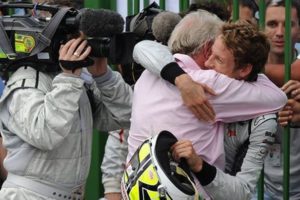 Q: Do we have to worry about you after the Abu Dhabi race? When reality bites?
Q: Do we have to worry about you after the Abu Dhabi race? When reality bites?
JB: The Abu Dhabi weekend definitely will be emotional. The last couple of years have been quite difficult without my father. So yes, my last race will be tough – but my mum will be there, one of my sisters and lots of my friends. So it will be a very special weekend. It will not be the end – it will be a new beginning.

